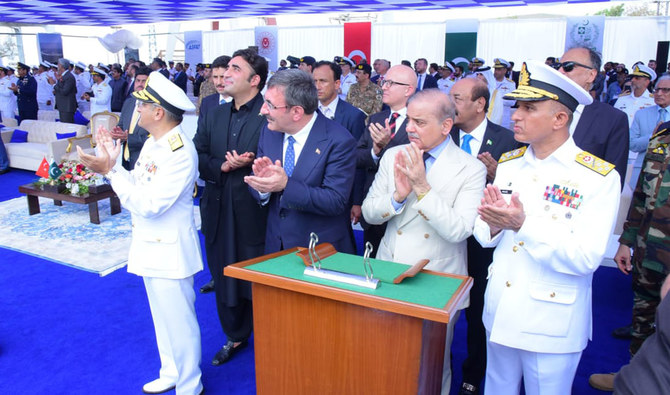ISLAMABAD: Pakistan and Turkiye on Wednesday jointly launched a MILGEM class corvette warship at the Karachi port, part of a four-vessel deal between Islamabad and Ankara.
Turkiye announced in 2017 the two countries had signed a memorandum of understanding for the sale of four Turkish made corvette warships and 52 Pakistan-made training planes for Ankara’s armed forces. Ankara described it as Turkiye’s biggest single military export deal and “a very important day” for the defense industry. The contract was formally signed in 2018.
Under the deal, the Karachi Shipyard (KS&EW) would buy four corvettes made under Turkiye’s MILGEM warship program, aimed at designing and building locally a fleet of multipurpose corvettes and frigates that could replace older ships. As per the 2018 contract, two of the ships were to be manufactured in Istanbul and two in Karachi.
“This is the fourth ship of this class and the second one built in Pakistan jointly by Asfat Istanbul and the Karachi Shipyard and Engineering Works,” Pakistani Prime Minister Shehbaz Sharif said during the launch ceremony of the corvette in Karachi along with Vice President of Turkiye Cevdet Yilmaz.
“Today’s joint venture project is another example of our commitment to support each other, strengthen each other’s industries and trade, and enhance our economic cooperation.”
The first two corvettes, PNS Babur and PNS Badar, were launched in Istanbul and Karachi, in August 2021 and May 2022, respectively. A third one, PNS Khyber, was launched in Istanbul in November 2022.
“These corvettes will be fitted with state-of-art Surface, Sub-Surface and Anti-Air Weapons & Sensors, integrated through an advanced Network Centric Combat Management System,” the Pakistan navy said in a statement in 2021.
The navy said the induction of the corvettes would significantly enhance the force’s maritime defense and deterrence capabilities: “These corvettes will become a core element of PN’s kinetic response to traditional and non-traditional challenges and to maintain balance of power in the Indian Ocean Region.”
Under the MILGEM project, Turkiye has built several multipurpose corvettes, frigates, and destroyers that can be deployed in a range of marine missions.












